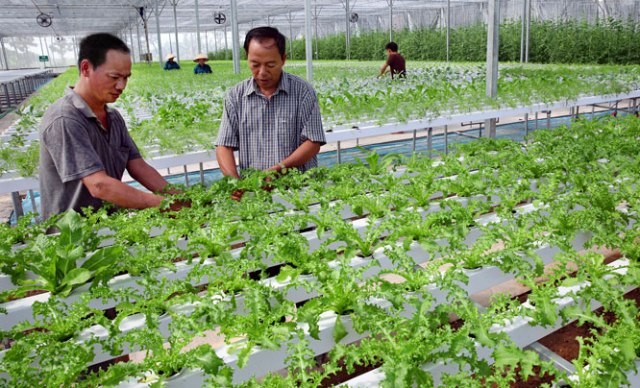
Hanoi’s agricultural sector has strengthened safe areas
Latest
 |
| Hanoi’s agricultural sector has strengthened safe areas. (Source: VEN) |
Hanoi’s agricultural sector has strengthened safe agricultural areas to ensure sustainable production and provide a source of clean food for domestic and foreign consumers living in the capital city.
Nguyen Giap Dong, head of the Ba Vi District Economic Division, said that the district currently maintained a safe tea production area spanning 1,550ha and productivity of 10.5 tonnes per hectare per year. The output for the whole year is estimated at 16,275 tonnes of fresh buds, worth 350 million VND (14,900 USD) per hectare per year.
To help farmers maintain and expand safe production areas, Ba Vi district has supported and created favourable conditions for localities to innovate technology, ensure raw material sources and well manage tea quality.
It builds trademarks, product brands protected by intellectual property; builds good models of safe tea production and processing following Vietnamese Good Agricultural Practises (VietGAP) process.
Thanks to that, the district has successfully built the Ba Vi tea brand.
In Dong Anh District, Nguyen Anh Dung, deputy chairman of the district People’s Committee, said that the district had 1,180ha of vegetable production area including more than 500ha of large-scale safe vegetable production.
To control safe vegetable products’ quality, the district has promoted education to raise people's awareness about limiting pesticides. As the result, the amount of pesticides decreased by about 15 percent compared to previous years. Farmers have learned to use organic fertilisers, herbs and ensure food safety.
Regarding Hanoi's plans for safe agricultural production areas, Nguyen Thi Thu Hang, director of the Hanoi Sub-department of Agricultural, Forestry and Fisheries Quality Management, said that the whole city currently maintained over 5,000ha of safe vegetables areas including 43 vegetable planting models applying the Participatory Guarantee System (PGS) with a total area of 1,700ha.
Hanoi also maintaines more than 1,300ha of vegetables, fruits and tea according to VietGAP standards, 181ha of aquaculture in the direction of VietGAP, 88 livestock centres applying VietGAP standards and nearly 50ha of farms following organic agriculture standards.
Besides, Hanoi continues to develop 141 chains of safe agricultural products manufacture and consumption.
Safety-oriented production not only helps farmers sell at prices which are 10-15 percent higher than traditional products, but also helps sectors manage quality of products sold on the market.
To create sources of clean and safe food from large-scale production areas, Nguyen Manh Hong, director of the Duc Phat Hi-tech Agriculture Cooperative in Yen My commune, Thanh Tri district, said that Hanoi needed to invest in infrastructure in collective production areas, support cooperatives and enterprises in capital with preferential interest rates when building safe production farms.
The capital city should also open training courses on high-tech application production, associate with enterprises to consume safe products, said Hong.
Deputy chairman of the Ung Hoa District People's Committee Ngo Tien Hoang said that the district continued to create favourable conditions to attract more and more potential enterprises to invest in agricultural production, expanding the scale of farm production areas and high-quality rice areas.
The district will expand high-tech safe vegetables to 170ha, specialty fruit trees with brands in the market to 600ha, expand aquaculture areas in the direction of efficiency, sustainability, ecological environment protection in Hoa Lam, Tram Long and Trung Tu communes.
Director of the Hanoi Department of Agriculture and Rural Development Chu Phu My said that in the future, Hanoi's agriculture sector would continue to work with local authorities to expand centralised production organisations together with high-tech applications, ecological agriculture, organic agriculture and advanced quality management systems.
The department will continue to guide and support enterprises to invest in agriculture, multiply safe production models, support farmers with capital from the Hanoi Agricultural Promotion Fund to expand production scale, creating a source of clean food with clear origin to provide to consumers.





















